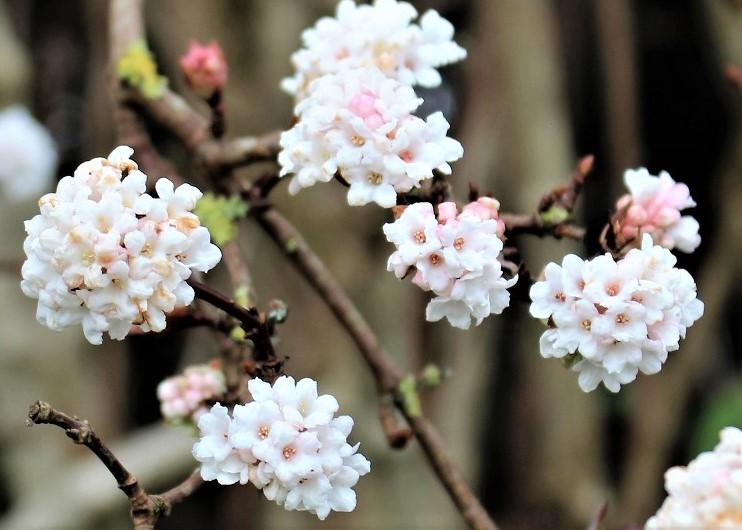DECEMBER
As we approach the shortest day, prepare for the new growing season: clear any remaining debris from vegetable plots, making sure not to compost any diseased material. Then dig them over and incorporate soil improvers, providing the soil is not frosted or too wet.
Spend the worst of the weather in the warm, with catalogues or on the internet, making sure you have the seeds you need.
Avoid walking on the lawn if it is covered in frost – this can damage the grass, leaving brown footprints.
Click on any picture or text link for more info
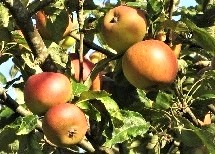 Apples, pears and soft fruit bushes can now be pruned.
Apples, pears and soft fruit bushes can now be pruned.
Make sure secateurs are sharp and disinfect blades between trees by wiping with methylated spirits / surgical spirit.
Stop pruning if it falls to 4oC, to avoid damaging cells swollen by the cold.
The pruning of restricted forms (cordons, fans, espaliers, step-overs etc.) should be left until summer.
Do not prune plums or any other stone fruit 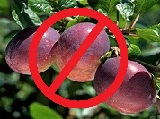 (apricots, peaches & cherries – including ornamental ones) in winter, as this increases the risk of infection with diseases to which they are prone: silver leaf and bacterial canker.
(apricots, peaches & cherries – including ornamental ones) in winter, as this increases the risk of infection with diseases to which they are prone: silver leaf and bacterial canker.
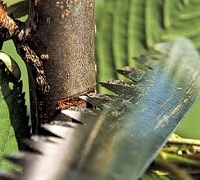 Pruning of vines, acers and birches,
Pruning of vines, acers and birches,
if any is required, should be done before Christmas to avoid sap bleeding from the cut.
Grey mould (Botrytis cinerea) can 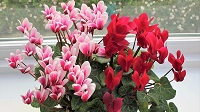 be a problem with winter-flowering plants in the home and greenhouse – cyclamen are particularly prone, but dead-heading regularly can keep it at bay.
be a problem with winter-flowering plants in the home and greenhouse – cyclamen are particularly prone, but dead-heading regularly can keep it at bay.
Houseplants: reduce watering and feeding 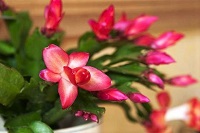 as the days shorten.
as the days shorten.
Check they have the light they need – they can easily be forgotten in a back room that receives little natural light, or where the curtains are left closed. They are best moved to sunny window sill until March.
Greenhouses and conservatories:
open vents for an hour or two on milder days, as ventilation will reduce the risk of fungal infections.
Water plants sparingly and maintain as dry an atmosphere as possible for the same reason. Also remove any yellowing leaves from overwintering plants.
Thinking of planting fruit trees?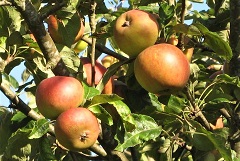
It’s important to choose varieties that will pollinate each other, so that they can give a good crop.
Click to find out more and to access easy-to-use pollination compatibility checkers
Protect outside taps from frost.
Close the tap on the supply pipe inside the house, then open the outside tap to give the water left inside space to expand if it freezes. If the outside tap cannot be isolated from inside, make sure it is well insulated to stop it freezing and bursting the pipe or joints.
Be prepared for snow this winter.
Snow can splay or break branches of conifers and light-limbed trees & shrubs, so brush off excess snow before it builds up.
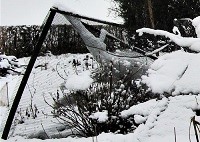 Remove the top netting from any fruit cages – snow can sit on top of it and its weight can break the frame.
Remove the top netting from any fruit cages – snow can sit on top of it and its weight can break the frame.
Also, check whether any of the items from November still need attention.
Wildlife in the garden
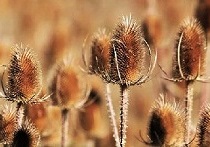
Leave seedheads standing
For wildlife cover, bird food & winter structure.
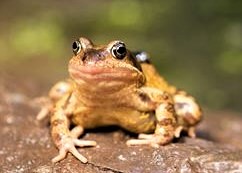
Help Frogs & Toads Overwinter
You don’t need a pond, just a few minutes work
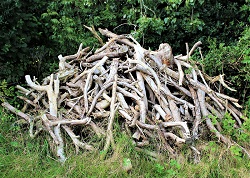
Use Old Wood to Benefit Wildlife
A feature in an odd corner that will welcome a variety of life.
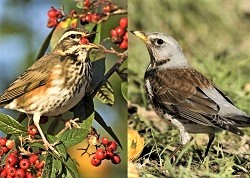
Winter Thrushes
Find out more about these visitors from Sussex Wildlife Trust.
Click any day below for a more detailed weather forecast, which also looks further ahead

